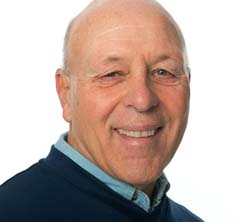 |
 |
| current issue |  |
past issues |  |
send a letter/news |  |
address update |  |
advertise |  |
about us |  |
alumni home |
Question/Answer
|
The Comeback Kid Tim Churchard '65, '84G dropped out and flunked out and still managed to earn four degrees. But boys today may not get that lucky, he says. By Rebecca Rule '76, '79G |
|
 |
Q: You teach a course on the challenges of "Growing Up Male in America." What's wrong with the way boys are raised?
A: What's wrong? Society is what's wrong. What we value. After Columbine, Susan Faludi, a feminist activist, wrote the book Backlash. In the middle of her research she said, "I changed my question. There's nothing wrong with boys and men—it's society that's wrong." We grow up in what William Pollack calls a gender straitjacket. If we do what's expected of us, we get rewarded famously. If we don't do that, we get punished. We don't accept the whole boy.
Q: And what about school?
A: Bill Cosby said, "They never let you run in the halls, and it's the only place you can get up any real speed." In Finland, every hour and a half of school, they go outside for 20 minutes. Here, we're cancelling recess. Boys are absolutely in crisis. Their reading scores are plummeting. The dropout rate for males is going through the roof in high school and college.
Q: You think there's a correlation.
A: One teacher said very wisely, "If you tell a group of boys to line up and be quiet for anything more than 30 seconds, you're going to have a pushing match on your hands. They can't stand still that long." ADHD is over-diagnosed. We just don't know how to deal with boys.
Q: What's the solution?
A: Fathers need to get emotionally involved with their sons. I did a comprehensive research project on fathers and sons. And the people who were identified as outstanding fathers were emotionally involved. And they had fewer rules. They didn't tell the kid everything to do. They said, "I expect you to make the right decision." My father did that for me. Now with cell phones, they want in on every decision the kid makes. And dads need to read to their sons.
Q: You're a sports psychology coach for the hockey and football teams. What drew you to this field?
A: Athletics was my ticket through adolescence. But when I got to UNH, I struggled. I quit and went home and lived with a friend. The athletic director came looking for me. He said, "You can't quit. We're paying for you. You have to finish." I said to myself, well, if I can't quit, then I'll flunk out. I worked construction all winter. Everyone was bugging me—"you stupid idiot." And they were right. Giving up the opportunity to get an education.
Q: What made you change your mind?
A: Whoops Snively, a football and hockey coach—I was playing both sports—told me, "Don't come back because people are telling you to come back. You have to really want to do this. When you come back, if you do, I've got a cabin next to my house. That's where you're going to live." He also told me, "I want you to bring something with you that reminds you why you're here." I've got it right here. It's a 20-ounce hammer. I put it on the wall of the cabin to remind me—this is what I'd go back to.
Q: Any regrets?
A: After Whoops died, I didn't get along with the new hockey coach. I told him I wanted hockey to pay for my books. He said all the money was committed. I said, "Well, I don't have to play." So I never found out how good I was. I tell my players, that's the worst thing—never knowing how good you could have been.~
blog comments powered by Disqus

